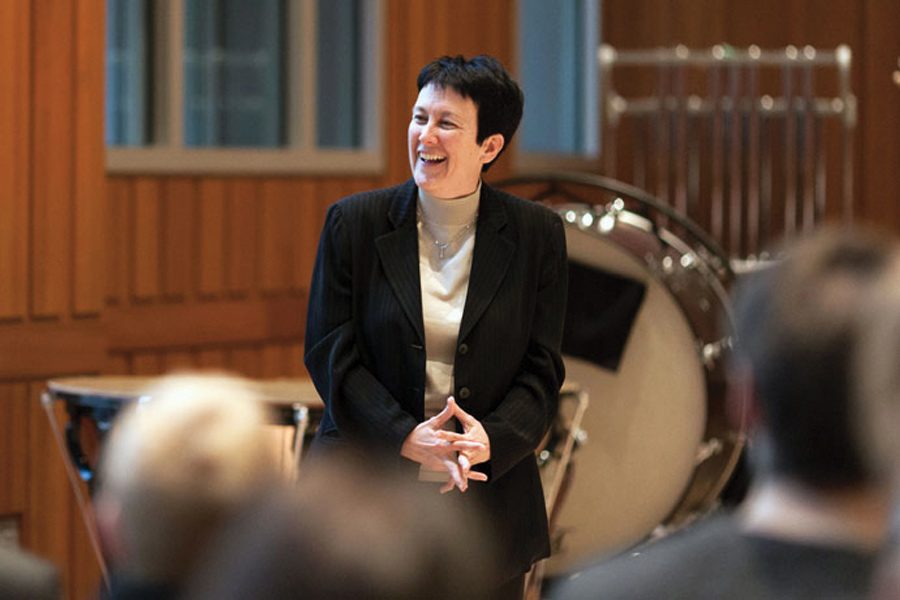Grammy, Pulitzer winner Jennifer Higdon awarded 2018 Nemmers Prize in Musical Composition
Jennifer Higdon teaches at a workshop. The Bienen School of Music awarded Higdon the 2018 Nemmers Prize in Music Composition this month.
April 25, 2018
A&E
Jennifer Higdon wrote her first composition as a flute performance major at Bowling Green State University. Her flute teacher assigned her to create a piece for flute and piano, and from then on, she was hooked.
“Just that experience was enough to wet my appetite for composing,” Higdon said.
More than 30 years later, the Bienen School of Music awarded Higdon the 2018 Nemmers Prize in Music Composition. The prize honors contemporary classical music composers who have significantly influenced the field of composition. It comes with a $100,000 cash prize, a performance of her work by the Chicago Symphony Orchestra and two on-campus residencies to work with Bienen students, according to a Bienen news release.
Bienen Dean Toni-Marie Montgomery said the prize was awarded to Higdon because of her extensive body of work, which features more than 150 compositions, as well as accolades including a Pulitzer Prize in Music and two Grammy awards.
Montgomery said the award is the largest cash prize for composers, tied with the Grawemeyer Award given by the University of Louisville. She said the Nemmers prize is different, however, because it recognizes a composer’s lifetime body of work and also requires the recipient to schedule residencies on campus. Higdon’s first on-campus residency is scheduled for Oct. 15-20.
Montgomery said the on-campus residency is beneficial for young musicians because it gives students the chance to perform a modern composer’s work and ask clarifying them questions, rather than just relying on musical convention.
“If you’re playing music that is not of a living composer, you’re going on tradition, how your teacher learned the work, or how they are recorded,” Montgomery said. “The opportunity to ask questions with the composer right there is a really wonderful opportunity for our students and faculty.”
In addition to collaborations with Bienen ensembles and students during her on-campus residencies, Montgomery said she would like to organize a panel with Higdon and Northwestern faculty members from other fields to talk about their experiences as LGBTQ+ professionals, and how this “impacts their creative activities.”
Montgomery said discussions such as these would allow Higdon’s residency to benefit the campus as a whole, not just the Bienen school.
Higdon said she would also like to talk about the business aspect of music composition during her on-campus residency, as she runs her own publishing company in addition to composing. Higdon recalled hearing composer Philip Glass give a talk in which he advised students about copyrights, saying it was one of the first times she heard a composer address the business side of music composition.
“I’m hoping to bring this in with me to talk to anyone who’s working in a creative field about what it’s like to try to balance the business aspect along with the creative aspect,” Higdon said.
Bienen lecturer Desirée Ruhstrat, a friend of Higdon’s for years, said she is glad Higdon received the prize not just because of her substantial body of work, but because of her generous spirit and dedication to teaching the next generation.
“Sometimes this is given to a great composer but not necessarily somebody that is as dedicated to teaching and working with people,” Ruhstrat said. “She’s just an amazing person outside of her composing.”
Higdon said she had been aware of the Nemmers prize since its creation, adding that her win feels “mind-blowing.” She said she has a lot of respect for NU and Bienen, so the award carries extra weight.
Higdon said she is honored to be in the same category as many prestigious contemporary composers.
“It’s still sinking in, I’m still adjusting,” she said, laughing. “I’m amazed. It’s kind of unreal.”
Email: [email protected]
Twitter: @charwalsh_


